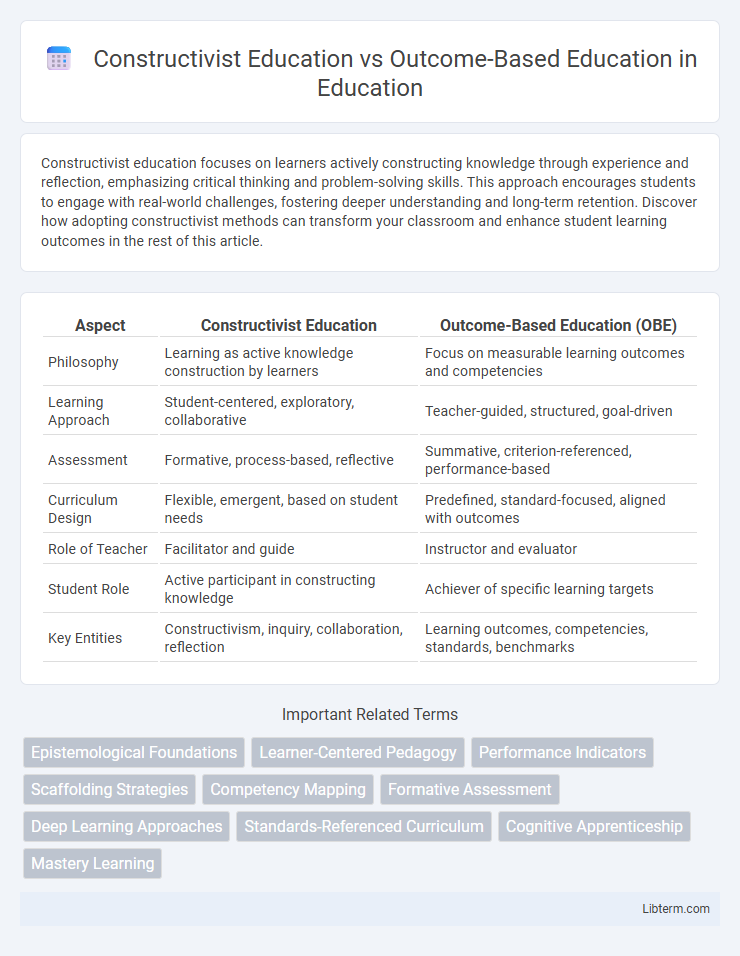Constructivist education focuses on learners actively constructing knowledge through experience and reflection, emphasizing critical thinking and problem-solving skills. This approach encourages students to engage with real-world challenges, fostering deeper understanding and long-term retention. Discover how adopting constructivist methods can transform your classroom and enhance student learning outcomes in the rest of this article.
Table of Comparison
| Aspect | Constructivist Education | Outcome-Based Education (OBE) |
|---|---|---|
| Philosophy | Learning as active knowledge construction by learners | Focus on measurable learning outcomes and competencies |
| Learning Approach | Student-centered, exploratory, collaborative | Teacher-guided, structured, goal-driven |
| Assessment | Formative, process-based, reflective | Summative, criterion-referenced, performance-based |
| Curriculum Design | Flexible, emergent, based on student needs | Predefined, standard-focused, aligned with outcomes |
| Role of Teacher | Facilitator and guide | Instructor and evaluator |
| Student Role | Active participant in constructing knowledge | Achiever of specific learning targets |
| Key Entities | Constructivism, inquiry, collaboration, reflection | Learning outcomes, competencies, standards, benchmarks |
Understanding Constructivist Education
Constructivist Education emphasizes active learning where students build knowledge through experiences and reflection, promoting critical thinking and problem-solving skills. This approach encourages collaborative learning and real-world application, enabling learners to construct their own understanding rather than passively receiving information. Unlike Outcome-Based Education, which centers on predefined goals and measurable results, Constructivist Education prioritizes the learning process and individual cognitive development.
Principles of Outcome-Based Education
Outcome-Based Education (OBE) centers on clearly defining measurable learning outcomes that students must achieve by the end of a course or program, emphasizing competency and mastery. This educational approach prioritizes continuous assessment and alignment of curriculum, teaching methods, and evaluation to ensure all learners meet specified performance standards. Unlike Constructivist Education, which focuses on knowledge construction through experience, OBE mandates accountability and results-oriented instruction designed to produce demonstrable skills and knowledge.
Core Philosophies: Constructivist vs Outcome-Based
Constructivist education centers on learner-driven knowledge construction, emphasizing active engagement, critical thinking, and real-world problem solving to build deep understanding. Outcome-Based Education (OBE) prioritizes clearly defined competencies and measurable results that students must achieve by the end of instruction, focusing on performance standards and accountability. While constructivism values the learning process and individual cognitive development, OBE concentrates on structured objectives and demonstrable skills acquisition.
Curriculum Design Approaches
Constructivist education emphasizes curriculum design that encourages active learner engagement, critical thinking, and knowledge construction through real-world experiences, prioritizing adaptability and student-centered learning environments. Outcome-Based Education (OBE) centers curriculum around clearly defined competencies and measurable results, ensuring all instructional activities align with specific learning outcomes to guarantee consistent skill acquisition. While constructivism fosters exploration and conceptual understanding, OBE structures curriculum with rigid performance targets, promoting accountability and standardized assessment.
Teacher and Student Roles Compared
In constructivist education, teachers act as facilitators guiding students to build knowledge through exploration, while students take an active role in discovering and constructing understanding. Outcome-based education positions teachers as designers and assessors of clear learning objectives, with students focused on achieving predefined outcomes through structured tasks. The teacher's role shifts from guiding open inquiry in constructivism to ensuring mastery of competencies in outcome-based models, influencing student autonomy and engagement accordingly.
Assessment Methods in Both Paradigms
Constructivist education employs formative assessment methods such as observations, portfolios, and reflective journals to gauge students' understanding through real-world problem-solving and active engagement. Outcome-based education utilizes summative assessments like standardized tests, rubrics, and competency checklists to measure learners' achievement against predefined learning outcomes. Both paradigms emphasize assessment as a tool for guiding instruction but differ in focus; constructivism prioritizes process and critical thinking, while outcome-based education concentrates on measurable performance indicators.
Impact on Critical Thinking and Creativity
Constructivist education fosters critical thinking and creativity by emphasizing active learning, problem-solving, and knowledge construction through hands-on experiences and collaborative inquiry. Outcome-Based Education (OBE) focuses on measurable results and mastery of predetermined skills, which can limit opportunities for open-ended exploration and creative risk-taking. Research indicates that constructivist approaches more effectively nurture divergent thinking and higher-order cognitive skills essential for innovation.
Challenges and Limitations
Constructivist education faces challenges such as its reliance on student motivation and prior knowledge, which can lead to inconsistent learning outcomes across diverse classrooms. Outcome-based education (OBE) encounters limitations in its rigid assessment focus, often neglecting the development of critical thinking and creativity by emphasizing measurable results. Both approaches struggle with practical implementation constraints, including teacher training demands and resistance to shifting traditional curriculum structures.
Relevance to 21st Century Skills
Constructivist Education emphasizes active learning through problem-solving and critical thinking, fostering creativity and collaboration essential for 21st-century skills. Outcome-Based Education centers on clearly defined competencies and measurable results, aligning with workforce demands and accountability standards. Both frameworks aim to prepare students for complex, dynamic environments by promoting adaptability, communication, and digital literacy crucial in modern economies.
Choosing the Best Approach for Learners
Constructivist education emphasizes active learning through exploration and hands-on experiences, promoting deeper understanding by connecting new knowledge with prior experiences, which benefits learners by fostering critical thinking and problem-solving skills. Outcome-Based Education (OBE) centers on clearly defined learning outcomes and measurable results, ensuring that learners achieve specific competencies and skills aligned with educational goals. Selecting the best approach depends on learner needs and contexts, with constructivism supporting flexible, inquiry-driven environments, while OBE offers structured, goal-oriented pathways for skill mastery.
Constructivist Education Infographic

 libterm.com
libterm.com